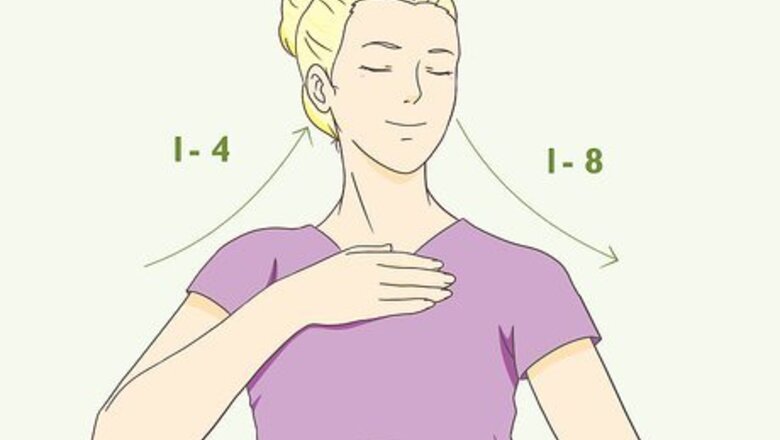
views
Managing Your Anxious Thoughts
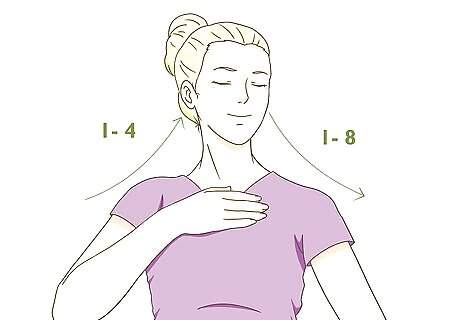
Try breathing exercises to help you calm down. Whenever you start feeling anxious or stressed, close your eyes and take deep breaths. Breathe in through your nose for 4 counts and then hold your breath for another 7 counts. Exhale slowly through your mouth for 8 counts while you make a “whoosh” sound. Keep taking deep breaths like this until you start feeling calm again. Try to recognize if your mind wanders during your exercises so you can refocus on your breathing again. When you exhale through your mouth, make a conscious effort to rest your tongue on the lower palette of your mouth. This mimics the state of your body when it's at rest, so it triggers the parasympathetic part of your nervous system, which has a calming effect.

Take notice of what triggers your anxiety. Don’t dwell on anxious thoughts since they could make you feel more stressed out. Instead, try to pinpoint what made you start feeling anxiety so you’re able to recognize your triggers easier. Stay aware of thoughts that regularly cause your anxiety so you can learn to avoid them. To help you picture your thoughts better, imagine that they’re buses that come and go through your head. You can either get on a “thought bus” and ride out your anxious feelings, or you can recognize them and let them pass.Variation: It can help to name your feelings as you experience them. For example, if you have a thought that stresses you out, you can say something like, “This is an anxious thought so I shouldn’t dwell on it.”
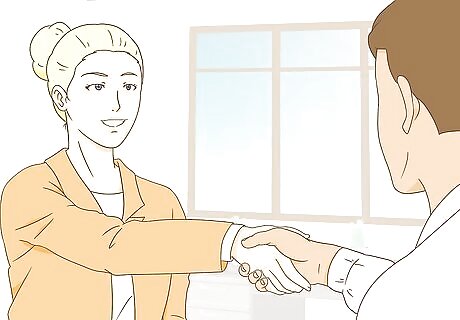
Accept that there are things you can’t change. Losing control of a situation may cause you a lot of anxiety, but it’s a normal feeling for many people. If you’re facing a bad situation, rather than focusing on what’s already happened and out of your control, think about the things that you can do for yourself instead. Look for what steps you can take moving forward to improve your situation so you have your best foot forward. For example, if the company you work for is going out of business and you’re losing your job, realize that you can’t change anything about your current position. Instead, focus on things you can control, like improving your resume and looking for a new job.
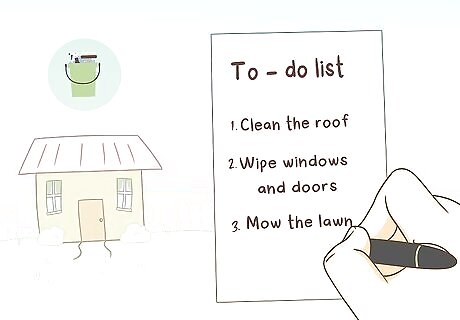
Reframe tasks into smaller goals so they don’t seem as overwhelming. Taking on a large project may seem daunting, but break it down into more manageable steps so you feel more in control. Take time to plan out specific and measurable goals so you can easily track your progress. Set what tasks you want to complete on an hourly, daily, or weekly schedule so you have a smaller amount of work to focus on at a time. For example, rather than thinking about having a 5-page essay due in 1 month, you may instead set goals to research and outline in the first week, write a page each day the second week, and then use the last 2 weeks to edit and revise. Do what tasks are the most important first so you have easier and more manageable tasks at the end.

Keep a journal to track your stress and anxiety. Carry your journal with you wherever you go so you can easily use it whenever you start feeling anxious. Write down what triggered your anxiety and what feelings you’re experiencing. Try to work through why the situation makes you feel anxious so you can recognize what’s causing your stress. As you keep experiencing anxious situations, you may start realizing past times you’ve felt the same so you can manage them better. Writing your feelings in a journal allows you to look back at how you handled similar situations so you recognize they aren’t as stressful as they may seem.

Talk about your feelings to a friend or family member. Choose somebody that you trust and is willing to listen to your concerns. Open up about why you’re feeling anxious and let them know if there is anything they can do to help you out. Do your best to fully explain why you’re feeling anxious since it can help you get better at recognizing your triggers. If you just want to vent, you can ask the person, “Hey, do you mind if I get something off my chest for a few minutes?” or “Is it alright if I vent for a little while?” You can also find an anxiety support group to discuss and manage your anxiety with other people going through similar situations.

Spend time in anxious situations so you feel more comfortable in them. Don’t avoid situations just because they stress you out, or else you’ll still feel anxious about them in the future. Instead, get involved in the activity a little bit at a time so you get used to it. As you start getting more comfortable, start going out of your comfort zone even more so you’re less likely to feel anxious in the future. For example, if you get anxious in large crowds, start by spending time around smaller groups of people. Then start going to bigger events with a friend or a group of people so you have people to support you. Over time, you may start feeling more comfortable in crowds by yourself.
Taking Care of Your Body
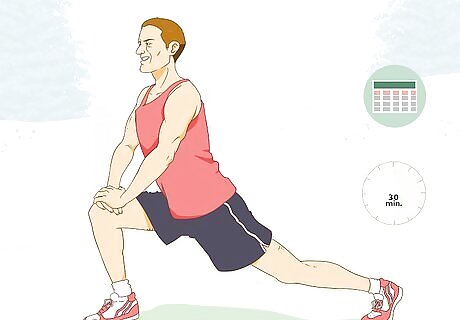
Exercise regularly to help release tension and boost your mood. Aim to do at least 30 minutes of moderate physical activity for 5 days out of the week. Try activities like jogging, swimming, hiking, cycling, or playing sports so you stay active throughout the entire workout. Even if you don’t have time to do full workouts, go out for short walks or practice bodyweight exercises when you have a few minutes to spare. Exercise can boost your serotonin levels, which naturally improves your mood so you don’t feel as stressed. Make a workout routine so you can follow a schedule, which may also help reduce your anxiety.

Maintain a regular, healthy eating schedule to keep up your energy. Avoid fatty or sugary foods since they won’t give you as much energy and could make you feel stressed. Instead, try to make meals that contain healthy foods, such as lean meats, whole grains, vegetables, and fruits. Only have enough food to feel satisfied so you don’t overeat. Eat your meals at regular times each day to make them routine. Avoid having caffeinated drinks since they can make you feel more stressed or anxious. Try meal prepping so you have a week’s worth of meals planned ahead of time. This can eliminate the stress or anxiety of finding something to eat.
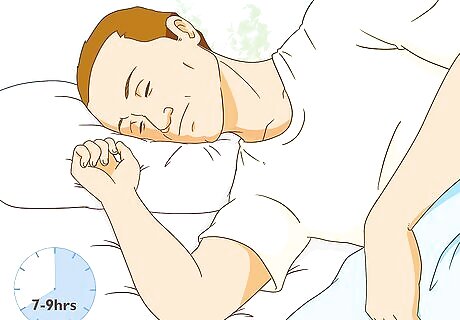
Get enough sleep at night so you’re well-rested. Do your best to go to sleep around the same time every night so your body gets used to a routine. Aim to get at least 7–9 hours of sleep each night to help your body get rest so you don’t feel anxious or stressed in the morning. Make sure your room is completely dark, or else you may have difficulty falling or staying asleep. Avoid using your phone or looking at screens right before going to bed because they can make it more difficult to fall asleep.
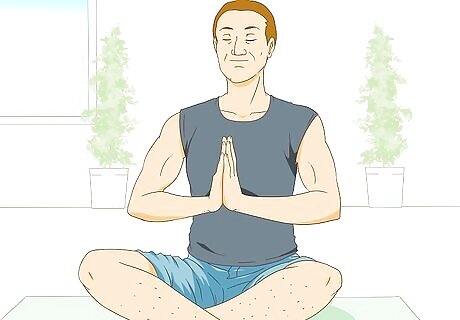
Practice relaxation techniques to ease your mind. Anxiety can make you feel on edge, so actively seek ways to calm down and keep your mind relaxed. Try taking a few deep breaths to see if that helps you manage your symptoms. In addition, try practicing meditation or yoga regularly to direct your focus away from your thoughts. Look for guided meditations online if you have trouble meditating on your own.Tip: Try listening to music or doing art when you feel anxious since these activities could help distract you and make you feel more relaxed.
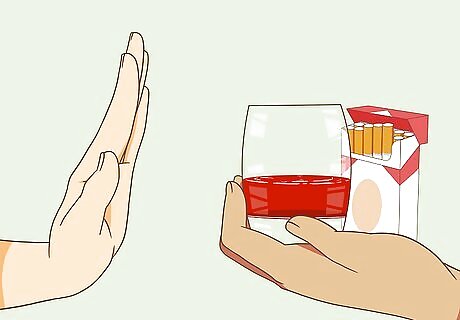
Stop or limit your smoking or drinking habits. Smoking and drinking may seem helpful at the moment, but they can actually make your anxiety feel worse. Do what you can to quit smoking of any kind to help your body recover easier. If you want to drink alcohol, only have 1–2 drinks per day. Have a glass of water for every alcoholic beverage you drink.
Trying Herbal Remedies
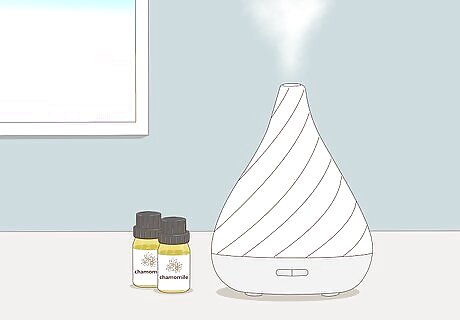
Try aromatherapy with chamomile oil so you can feel relaxed. Put a few drops of chamomile oil into a diffuser and let it warm up completely. Allow the vapor from the oil to fill the room as you go about your regular activities, or lie down and relax so your mind stays at ease. Take deep breaths in through your nose so you can smell the chamomile and feel it’s relaxing effects. You may also have a glass of chamomile tea to feel relaxed. You can buy chamomile essential oils online or from your local pharmacy. Chamomile contains compounds that are attributed to reducing anxiety and helping people sleep.
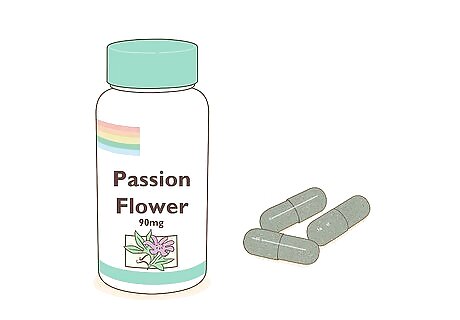
Take passionflower to combat restlessness and nervousness. Look for a 90-milligram passionflower or passiflora supplement online or at a drugstore, however, there is not yet conclusive scientific evidence for this supplement. Take a single dose of the passionflower each day to combat your symptoms. Continue taking the passionflower as long as you have anxious thoughts or restless feelings. Passionflower may cause dizziness, drowsiness, or confusion. Passionflower has anxiolytic properties, which means it naturally decreases anxious feelings. Do not take passionflower while pregnant as it may induce contractions.
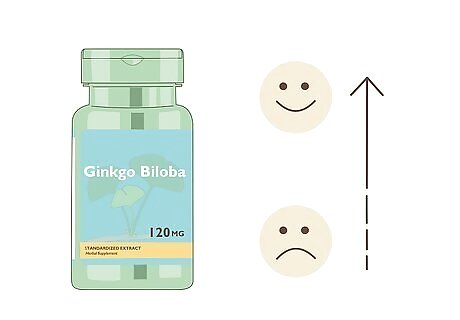
Have ginkgo biloba to possibly help improve your mood. Find ginkgo biloba supplements that have 120–240 milligrams online or at your local pharmacy. Take the ginkgo biloba once every day when you’re feeling anxious. You may continue taking your supplements every day without getting addicted. Ginkgo biloba may help stimulate serotonin production, which helps improve your mood so you don’t feel as worried or anxious. Talk to your doctor before starting any supplements to see if they have any interactions with other medications you’re taking.
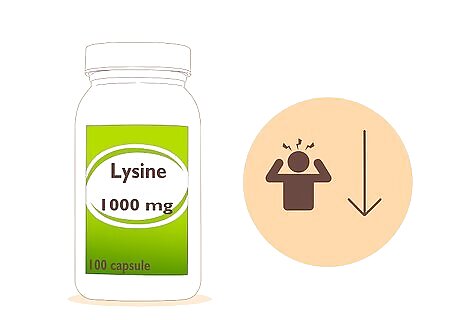
Use lysine if you need to reduce stress. Lysine is an amino acid that stimulates your brain’s serotonin production, which boosts your mood so you may feel less stressed or worried. Take a 2-gram lysine supplement even if you aren’t feeling symptoms so you’re less likely to feel stressed out. Continue taking the lysine each day to manage your anxiety. You can buy lysine from your local pharmacy.
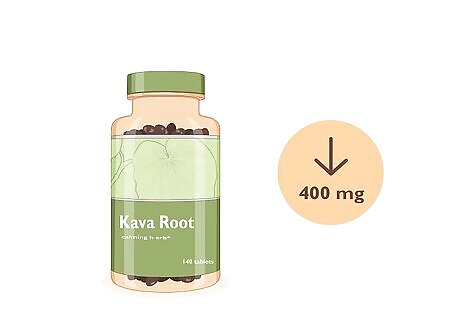
Try kava for a treatment option that doesn’t make you drowsy. You can mix kava powder into a glass of water for a drink or you can take an oral kava supplement. Limit yourself to less than 400 grams of kava daily, or else you may experience side effects like nausea or lung problems. Continue taking the kava daily so your symptoms don’t feel as severe. Kava is a plant from the South Pacific that helps release dopamine, which makes you feel happier, and eases anxiety symptoms.Warning: Using too much kava can lead to liver damage, and it may lead to dry or scaly skin with long-term use. Talk to your doctor before starting kava to see if there are any other risks.
When to Seek Medical Care
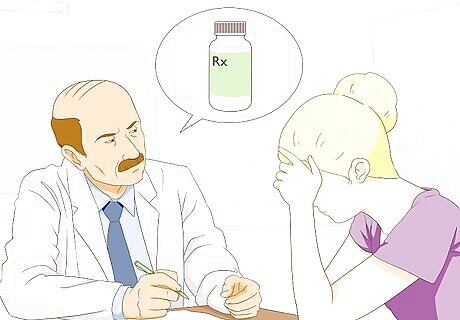
Talk to your doctor before trying supplements. While some herbal remedies or supplements may help reduce the symptoms of anxiety, they can also interact badly with certain medications or conditions. Before trying any supplement or herbal remedy, discuss the possible risks and benefits with your doctor. Give your doctor a full list of any medications or supplements you are currently taking, including over-the-counter medications, prescription medications, and vitamins or dietary supplements. Talk to your doctor about any physical health conditions or concerns you may have since these can affect what types of supplements you can safely use. Get emergency medical care if you have symptoms of a severe allergic reaction while taking a supplement, such as difficulty breathing or swallowing, a rapid heartbeat, fainting or lightheadedness, nausea and vomiting, or swelling of your face, lips, tongue, or throat.
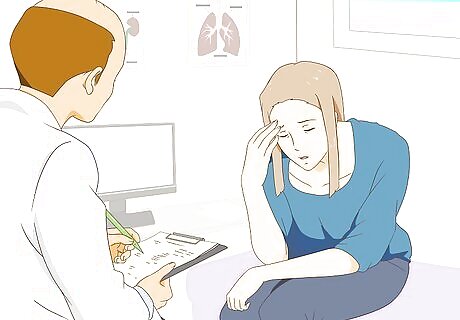
See your doctor if you have severe or persistent anxiety. Everyone deals with anxiety on occasion, but sometimes it can become overwhelming. If you feel like you’re so anxious that it’s interfering with your everyday life, work, or relationships, talk to your doctor to discuss possible treatment options or get a referral to a mental health specialist who can help. You should also see your doctor if your anxiety is causing you to feel depressed or hopeless, you are struggling with substance abuse problems, or you have any other mental health concerns or issues. Persistent stress and anxiety can contribute to physical health issues, such as heart problems or digestive problems. Let your doctor know if you’re having other symptoms along with anxiety. Possible treatments for anxiety include counseling, medications (such as antidepressants and anti-anxiety drugs), and lifestyle changes. Many people do best with a combination of treatments.
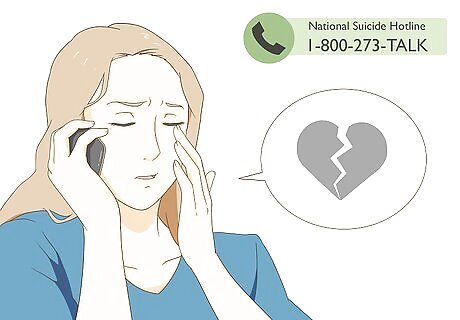
Get emergency medical care if you’re having suicidal thoughts. Dealing with severe anxiety can be very difficult and distressing. If you ever have thoughts of suicide or think you might hurt yourself, call emergency services or go to the emergency room. If you’re seeing a therapist, they might also have an emergency number you can call. If you live in the U.S., you can contact the 988 Suicide and Crisis Lifeline by calling or texting 988. If you can’t make a call, you can also chat with crisis counselors online at https://suicidepreventionlifeline.org/chat/. Another option is to text HOME to 741741 to chat with someone at the Crisis Text Line.



















Comments
0 comment